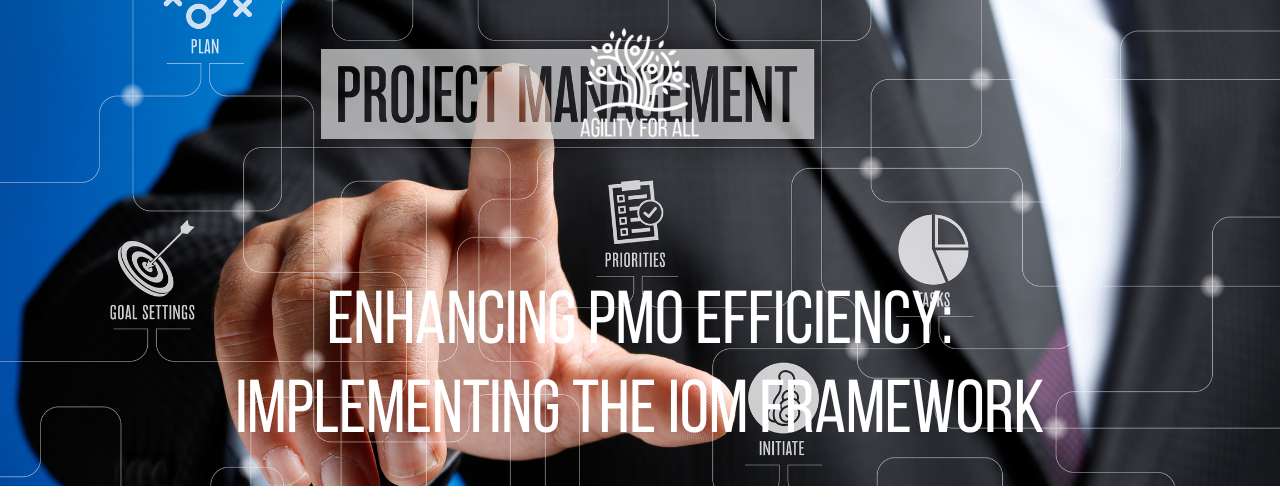Want an offsite in 2024 for your team? Or want to work on adapting your team culture? Schedule a call.

Enhancing PMO Efficiency: Implementing the IOM Framework
06/12/2023
Organizations face the constant challenge of managing numerous projects and products efficiently. Establishing a robust Program Management Office (PMO) process is vital to streamline operations, enhance project delivery, and maximize business value. This article outlines the implementation of the IOM (Intake, Onboarding, Management) Framework, an Agility for All structured approach designed to optimize project management within the organization.
Part 1: Intake
The first stage of the IOM framework is Intake, where project requests are collected, evaluated, and prioritized. This stage serves as the entry point for new initiatives and ensures alignment with organizational goals and resources. Key components of the Intake process include:
- Request Submission: Business teams submit project proposals through a centralized platform or designated PMO portal. A standardized lean business canvas is provided to capture essential project details such as objectives, scope, timeline, and resource requirements.
- Initial Assessment: Upon receiving project requests, the PMO conducts an initial assessment to evaluate feasibility, strategic alignment, and potential impact. Criteria such as ROI, resource availability, and risk factors are considered during this phase.
- Prioritization: Projects are prioritized based on strategic importance, resource and personnel availability, and organizational objectives. A transparent scoring system or decision matrix is employed to facilitate objective prioritization and allocation of resources.
- Approval Process: Approved projects undergo a formal approval process, involving stakeholders and senior management review. Clear criteria and decision-making guidelines are established to ensure consistency and fairness in project selection.
Part 2: Onboarding
Once projects are approved, the Onboarding stage focuses on preparing the necessary resources, teams, and infrastructure for successful project execution. This phase aims to set clear expectations, define roles and responsibilities, and establish communication channels. The central element of Onboarding is the Liftoff where there is a focus on Purpose, Alignment and Context. Key elements of the Onboard process include:
- Resource Allocation: The PMO collaborates with relevant departments to allocate resources, including personnel, budget, and technology, based on project requirements and priorities.
- Team Formation: Project teams are formed, comprising cross-functional members with the necessary skills and expertise. Team charters and kickoff meetings are organized to clarify goals, roles, and expectations.
- Training and Development: As required, training programs and skill development initiatives are conducted to equip team members with the necessary knowledge and capabilities to excel in their roles.
- Infrastructure Setup: The PMO ensures that essential infrastructure, tools, and systems are in place to support project execution. This may include management software, collaboration platforms, and communication tools.
Part 3: Management
The Management stage encompasses the ongoing monitoring, control, and evaluation of project progress to ensure alignment with objectives and timely delivery. This phase focuses on proactive risk management, stakeholder engagement, and performance tracking. While Agility for All recommends an iterative approach to all work as a method for proactively managing the key aspects described below, the method for managing a project will be dependent on the nature of the work performed. Key aspects of the Management process include:
- Performance Monitoring: Project performance metrics and KPIs are established to track progress, identify deviations, and measure success. Regular status meetings and progress reports are conducted to keep stakeholders informed and address any issues promptly.
- Risk Management: The PMO implements a robust risk management framework to identify, assess, and mitigate potential risks throughout the project lifecycle. Contingency plans and risk mitigation strategies are developed to minimize disruptions and ensure project resilience.
- Stakeholder Engagement: Effective communication and stakeholder engagement are essential for project success. The PMO fosters open communication channels, solicits feedback, and addresses stakeholder concerns to maintain alignment and support.
- Continuous Improvement: The PMO promotes a culture of continuous improvement by conducting post-project reviews, lessons learned sessions, and feedback surveys. Insights gained from these activities are used to refine processes, optimize resource allocation, and enhance project delivery capabilities.
The IOM framework offers a comprehensive and structured approach to project management, encompassing the key stages of Intake, Onboarding, and Management. By adopting this framework, organizations can streamline project initiation, enhance team collaboration, and improve overall project outcomes. The PMO plays a central role in driving the implementation of the IOM framework, ensuring alignment with organizational goals and delivering value to internal business teams. Embracing the IOM methodology empowers organizations to navigate complex projects more effectively and achieve sustainable growth in today's competitive landscape.
Learn more about the work that we do and the programs that we offer. Set up a call to start planning how you want to change the culture of your organization.
Learn More
About the Author:
 INDRA A. BOOKS
INDRA A. BOOKS
With more than 25 years of award-winning coaching and leadership experience, Indra has a passion for helping companies, teams, and individuals bring about meaningful, goal-oriented transformations which are firmly grounded in Agile principles. She currently works from Spain with companies around the world to achieve sustainable growth based on true agility; helping them make value-based changes and see results with high-performing teams.
Connect with us
 |
 |
 |
Search

WELCOME TO THE AGILITY FOR ALL LEARNING PORTAL
We offer loads of free information here in the blog and also in our
resource library
Agility for All provides coaching, consulting, and training programs. In addition to specialized consulting, you have the option to choose from:
- group coaching programs
- masterclasses
- 1-week intensive offsites
Our programs are designed to help your organization to:
- Maximize Employee Engagement
- Foster Self-Organization
- Encourage Innovation
- Attain Higher Performance
- Be More Agile
